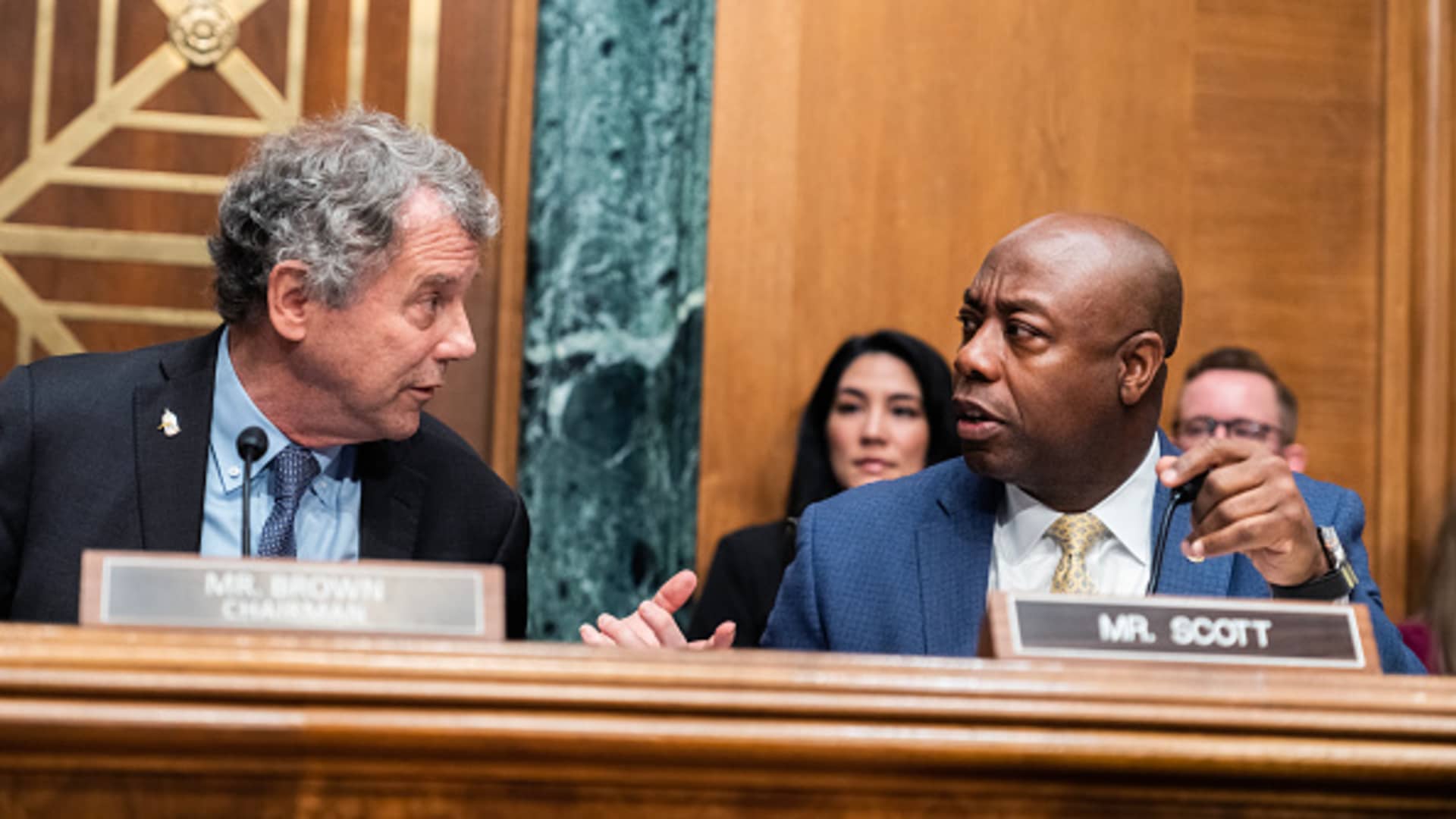Chairman Sherrod Brown, D-Ohio, and ranking member Sen. Tim Scott, R-S.C., arrived at the Senate Banking, Housing, and Urban Affairs Committee hearing on April 27, 2023. The hearing discussed recent bank failures.
Photograph by Tom Williams | Cq-roll Call, Inc. | Getty Images
WASHINGTON — On Wednesday, the Senate Banking Committee voted in favor of advancing a bill to the full Senate that aims to establish accountability for banking executives following the collapse of major banks.
The bill, known as the Recovering Executive Compensation from Unaccountable Practices Act or the RECOUP Act, would grant regulators the authority to claw back compensation from executives of failed banks, impose penalties for misconduct, and enforce stronger corporate governance measures, according to the committee.
The measure passed the committee with a vote of 21-2. Senators Thom Tillis (R-N.C.) and Bill Hagerty (R-Tenn.) voted against it.
Committee Chairman Sherrod Brown (D-Ohio) and Ranking Member Tim Scott (R-S.C.) reached an agreement on the legislation last week. Brown is up for reelection next year, while Scott is running for the 2024 Republican presidential nomination.
Key Provisions of the RECOUP Act:
The bill aims to:
- Authorize regulators to remove senior banking executives who engage in oversight misconduct, including failure to implement risk controls and breaches of fiduciary duty. Regulators would also have the discretion to ban these executives from the industry.
- Require banks to adopt bylaws that enforce responsible management, granting the bank’s board or the Federal Deposit Insurance Corporation the power to claw back executive compensation received within two years prior to a bank’s failure.
- Strengthen regulatory control over penalties for executives who violate the law and increase the maximum civil penalty for the most severe offenses.
- Define “senior executive” as individuals in senior leadership positions and certain directors within a bank.
Senator Scott described the bill as a “commonsense solution” to address executive accountability.
Senator Brown stated, “It is time for CEOs to face the consequences of their actions, just like everyone else.”
However, Senator Tillis argued that the bill is “too expansive” and could limit innovation for senior executives.
“By doing so, you may discourage individuals with good ideas that didn’t work out from pursuing C-suite positions. That is not malpractice, but rather a management decision that did not succeed,” Tillis said during the markup.
Senator Hagerty claimed that the bill “will inadvertently bolster the largest banks at the expense of smaller banks.”
In a statement released on Wednesday, Hagerty said, “Furthermore, it absolves government regulators and bureaucrats, whose supervision failures resulted in the collapse of Silicon Valley Bank, of any responsibility. In fact, it grants even more power to government agencies.”
The RECOUP Act is one of several legislative proposals introduced in recent months to address regulatory and management shortcomings that led to the failures of banks like Silicon Valley Bank and Signature Bank earlier this year.
Senator Elizabeth Warren (D-Mass.), a member of the Senate Banking Committee, spearheaded a bipartisan clawback bill alongside Democratic Senator Catherine Cortez Masto of Nevada, and Republican Senators Josh Hawley of Missouri and Mike Braun of Indiana.
Released in March, their bill calls for clawing back all or part of the compensation received by bank executives during the five years preceding a bank failure, compared to the two-year clawback period in the RECOUP Act.
Denial of responsibility! VigourTimes is an automatic aggregator of Global media. In each content, the hyperlink to the primary source is specified. All trademarks belong to their rightful owners, and all materials to their authors. For any complaint, please reach us at – [email protected]. We will take necessary action within 24 hours.


